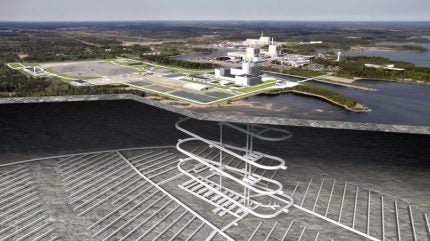
Sweden has initiated the construction of a repository for the long-term storage of spent nuclear fuel in Söderviken, close to the Forsmark nuclear power plant.
The Swedish Nuclear Fuel and Waste Management Company (SKB) received an environmental permit to build and operate the repository in October 2024.

Discover B2B Marketing That Performs
Combine business intelligence and editorial excellence to reach engaged professionals across 36 leading media platforms.
Approximately 12,000t of nuclear waste will be stored in a final spent fuel repository at a depth of 500m in rock that is 1.9 billion years old.
The spent fuel will be encased in 5m-long, corrosion-resistant copper capsules, which will then be surrounded by clay and entombed.
The site will include several buildings and a rock stockpile, covering a relatively small area of approximately 24ha.
The repository can safely contain the material for 100,000 years, according to Reuters.

US Tariffs are shifting - will you react or anticipate?
Don’t let policy changes catch you off guard. Stay proactive with real-time data and expert analysis.
By GlobalDataThis development makes Sweden the second country after Finland to undertake the creation of a permanent storage solution for highly radioactive waste.
Despite plans to start receiving waste by the late 2030s, the facility’s completion is anticipated for around 2080, when the tunnels will be sealed, according to SKB.
Upon completion, the spent fuel repository will accommodate more than 6,000 canisters, with 2.3 million cubic metres of rock excavated during construction. It will feature 66km of tunnels and span 3km² to 4km² underground.
However, this timeline may face delays due to an appeal by MKG, a Swedish NGO [non-governmental organisation] focused on nuclear waste, which has called for additional safety assessments.
They cited research from Sweden’s Royal Institute of Technology suggesting the potential for the copper capsules to corrode and release radioactive elements into groundwater.
The challenge of storing radioactive waste has persisted since the inception of commercial nuclear reactors in the 1950s.
Currently, the World Nuclear Association estimates that approximately 300,000t of spent nuclear fuel requires disposal globally, with most of it residing in cooling ponds near the reactors where it was used.
With an estimated cost of Skr12bn ($1.08bn), the financial burden of the Forsmark repository will fall upon the nuclear industry, said SKB.
The repository is expected to accommodate all waste from Sweden’s current nuclear power plants, but not from the ten additional reactors planned to be constructed by 2045.



